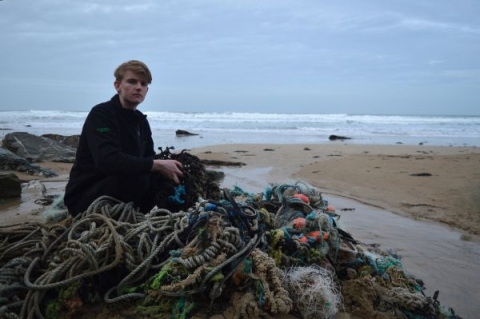

9 February 2021
2 min read
Behaviour change was the focus of an online plastic pollution workshop that was held for Portsmouth communities on Monday 8 February.
The interactive event hosted by the Environment Agency and the University of Portsmouth, was aimed at representatives from zero waste groups and plastic free communities who want to encourage local people to stamp out avoidable plastic waste in their lives.
Experts believe around 10 million tonnes of plastic waste enters the ocean every year, which is equivalent to a bin lorry load every minute.
Jonathan Harvey, from the Environment Agency’s Plastics and Sustainability Team, said: “Bringing together experts and sharing their valuable skills and experience with Portsmouth communities provides encouragement, confidence and reassurance that local organisations can make a real difference.
If we are going to improve the quality of our environment, it is important to get everybody involved. This workshop supports communities with the latest tools, knowledge, and evidence to change behaviours and tackle plastic pollution within their patch
Jonathan Harvey, Environment Agency’s Plastics and Sustainability Team
“We’re encouraging everybody to re-evaluate the things that they buy and consume - to step away from single-use items and choose more reusable, repairable, and sustainable alternatives.
“Whatever you do, small steps will contribute towards creating cleaner communities and marine environments.”
Attendees also had the chance to discuss the barriers they have faced in trying to change people’s behaviours, how to engage hard to reach groups, and how they can apply behaviour change theory to their own work.
The University of Portsmouth is delighted to be working with the Environment Agency, our community partners, to support actions that are better for people and the planet. Community-based action is critical to building healthy and sustainable communities.
Professor Steve Fletcher, Director of Sustainability and Environment at the University of Portsmouth
The workshop was the second plastic pollution event aimed at Portsmouth communities as part of the EU-funded Interreg Preventing Plastic Pollution project – a programme to understand and reduce the impacts of plastic pollution in river and marine environments. The first workshop took place in October and encouraged communities to form a network, access resources and collectively start taking steps to tackle plastic pollution.
The event formed part of the University’s Revolution Plastics initiative, which is a central hub of plastics research that could offer potential solutions to the crisis. It draws together colleagues from across the institution, most notably from the Centre for Blue Governance, the Institute of Marine Sciences and the Centre for Enzyme Innovation.
Through Revolution Plastics, the University is creating best practice for addressing plastics pollution, both internally and externally; generating a globally-relevant community of plastics researchers and contributing to the sustainable transition of the city of Portsmouth as a prototype and showcase for a sustainable plastics future. The University is uniquely placed as an independent evidence provider at the interface of government, businesses, citizens, and researchers.
